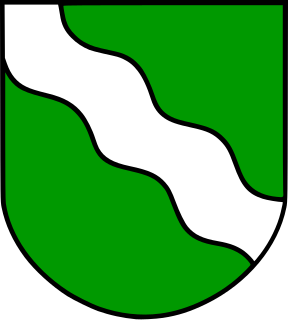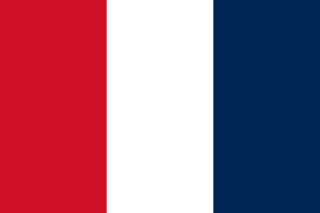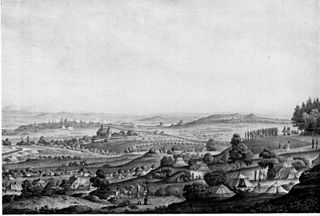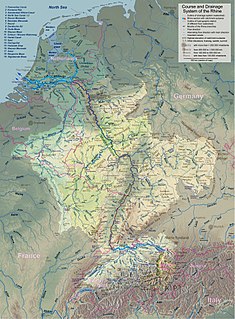
The Declaration of the Rights of Man and of the Citizen, set by France's National Constituent Assembly in 1789, is a human civil rights document from the French Revolution.

Mainz is the capital and largest city of Rhineland-Palatinate, Germany. The city is located on the Rhine river at its confluence with the Main river, opposite Wiesbaden on the border with Hesse. Mainz is an independent city with a population of 206,628 (2015) and forms part of the Frankfurt Rhine-Main Metropolitan Region.

The Rhineland is the name used for a loosely defined area of Western Germany along the Rhine, chiefly its middle section.

In the history of France, the First Republic, officially the French Republic, was founded on 22 September 1792 during the French Revolution. The First Republic lasted until the declaration of the First Empire in 1804 under Napoleon, although the form of the government changed several times. This period was characterized by the fall of the monarchy, the establishment of the National Convention and the Reign of Terror, the Thermidorian Reaction and the founding of the Directory, and, finally, the creation of the Consulate and Napoleon's rise to power.

The War of the First Coalition is the traditional name of the wars that several European powers fought between 1792 and 1797 against the French First Republic. Despite the collective strength of these nations compared with France, they were not really allied and fought without much apparent coordination or agreement. Each power had its eye on a different part of France it wanted to appropriate after a French defeat, which never occurred.
Mainz-Bingen is a district (Kreis) in the east of Rhineland-Palatinate, Germany. Neighboring districts are Rheingau-Taunus, the district-free cities Wiesbaden and Mainz, the districts Groß-Gerau, Alzey-Worms, Bad Kreuznach, and Rhein-Hunsrück.

The French Revolutionary Wars were a series of sweeping military conflicts lasting from 1792 until 1802 and resulting from the French Revolution. They pitted France against Great Britain, Austria, Prussia, Russia and several other monarchies. They are divided in two periods: the War of the First Coalition (1792–97) and the War of the Second Coalition (1798–1802). Initially confined to Europe, the fighting gradually assumed a global dimension. After a decade of constant warfare and aggressive diplomacy, France had conquered a wide array of territories, from the Italian Peninsula and the Low Countries in Europe to the Louisiana Territory in North America. French success in these conflicts ensured the spread of revolutionary principles over much of Europe.

Liberté, égalité, fraternité, French for "liberty, equality, fraternity", is the national motto of France and the Republic of Haiti, and is an example of a tripartite motto. Although it finds its origins in the French Revolution, it was then only one motto among others and was not institutionalized until the Third Republic at the end of the 19th century. Debates concerning the compatibility and order of the three terms began at the same time as the Revolution. It is also the motto of the Grand Orient de France and the Grande Loge de France.

The Cisrhenian Republic was a client state of the French Revolutionary Wars. It was proclaimed in 1797 on the Left Bank of the Rhine under French occupation.

Revolutionary France enacted laws that first emancipated Jews in France, establishing them as equal citizens to other Frenchmen. In countries that Napoleon Bonaparte's ensuing First French Empire conquered during the Napoleonic Wars, he emancipated the Jews and introduced other ideas of freedom from the French Revolution. For instance, he overrode old laws restricting Jews to reside in ghettos, as well as lifting laws that limited Jews' rights to property, worship, and certain occupations.

Karl Theodor Anton Maria von Dalberg was Prince-Archbishop of Regensburg, Arch-Chancellor of the Holy Roman Empire, Bishop of Constance and Worms, Prince-Primate of the Confederation of the Rhine and Grand Duke of Frankfurt.

The Republic of Mainz was the first democratic state on the current German territory and was centered in Mainz. A product of the French Revolutionary Wars, it lasted from March to July 1793.

Dülken is a town located in the North Rhine-Westphalia state of Germany. It has a population of about 20,000. It is part of the municipality of Viersen. It received its town charter in 1364 thus being the oldest part of the municipality of Viersen. It lies in the administrative region of Düsseldorf. The river Nette having its source underground in the middle of the town rises near the town. The town motto is, "Gloria tibi Duelken", or "Glory to you, Duelken".

Nackenheim is an Ortsgemeinde – a municipality belonging to a Verbandsgemeinde, a kind of collective municipality – and a winegrowing centre in the Mainz-Bingen district in Rhineland-Palatinate, Germany.

Mainz-Drais (Drais) is a borough in the western part of Mainz. The village was suburbanised by the City of Mainz in 1969, and is now its smallest subdivision, with just over 3,000 permanent residents.

The Mainz Carnival is a months-long citywide carnival celebration in Mainz, Germany that traditionally begins on 11 November but culminates in the days before Ash Wednesday in the spring.

A variety of customs and traditions are associated with Carnival celebrations in the German-speaking countries of Germany, Switzerland and Austria. They can vary considerably from country to country, but also from one small region to another. This is reflected in the various names given to these festivities occurring before Lent.

In Northern European historiography, the term French period refers to the period between 1794 and 1815 during which most of Northern Europe was controlled by Republican or Napoleonic France. The exact duration of the period varies by the location concerned.
The French Revolution had a major impact on Europe and the New World. Historians widely regard the Revolution as one of the most important events in human history. In the short-term, France lost thousands of her countrymen in the form of émigrés, or emigrants who wished to escape political tensions and save their lives. A number of individuals settled in the neighboring countries, however quite a few also went to the United States. The displacement of these Frenchmen led to a spread of French culture, policies regulating immigration, and a safe haven for Royalists and other counterrevolutionaries to outlast the violence of the French Revolution. The long-term impact on France was profound, shaping politics, society, religion and ideas, and polarizing politics for more than a century. The closer other countries were, the greater and deeper was the French impact, bringing liberalism and the end of many feudal or traditional laws and practices. However, there was also a conservative counter-reaction that defeated Napoleon, reinstalled the Bourbon kings, and in some ways reversed the new reforms.

The siege of Mainz was a short episode at the beginning of the First Coalition, for the victorious French army of Custine who seized the town October 21, 1792, after three days of siege. The French occupied Mainz, and tried to install the Republic of Mainz there.

























